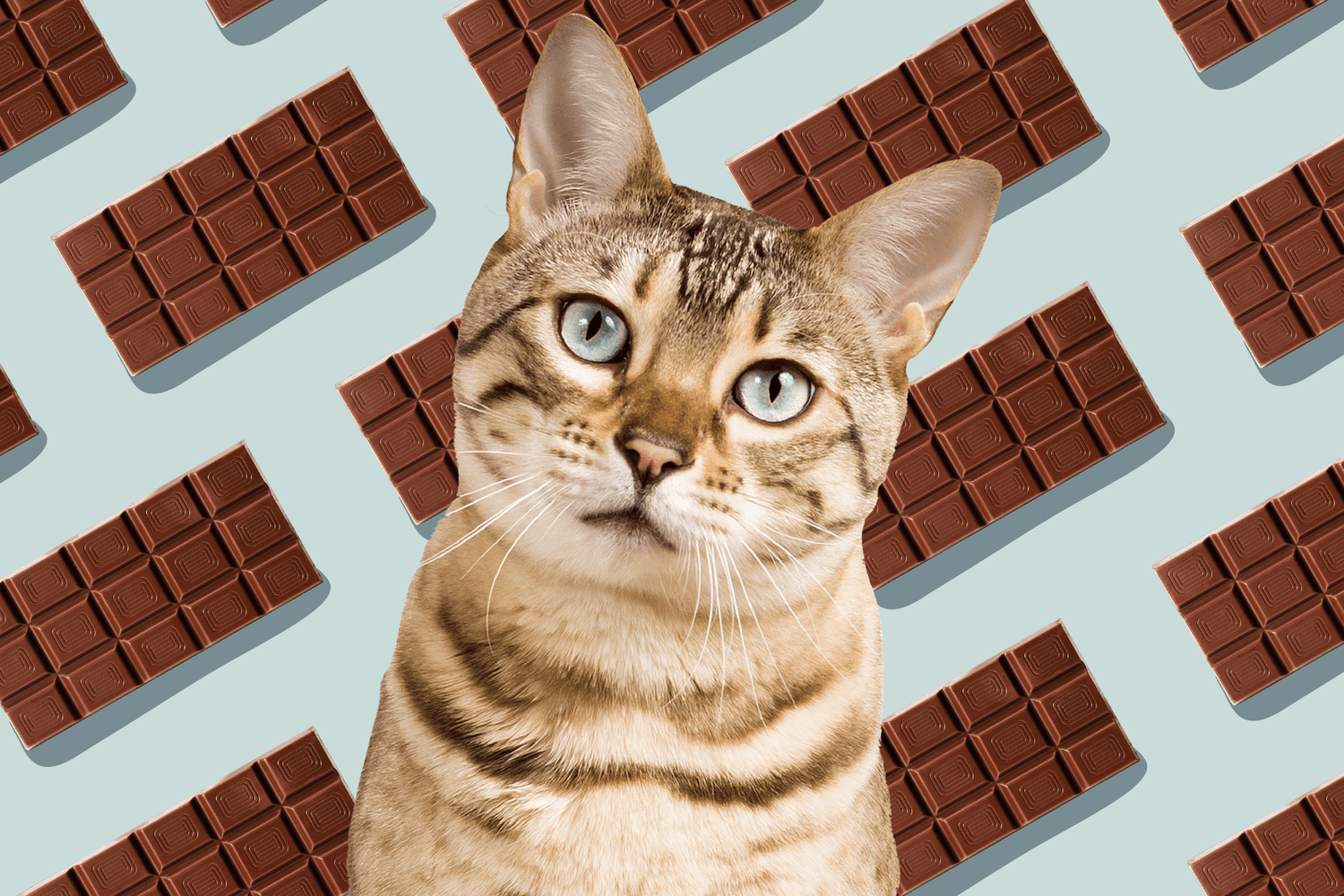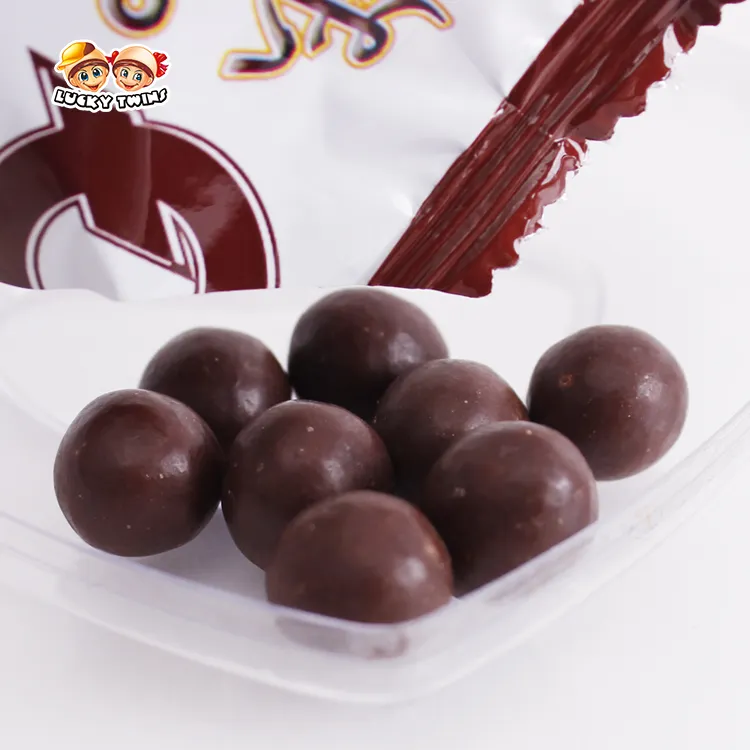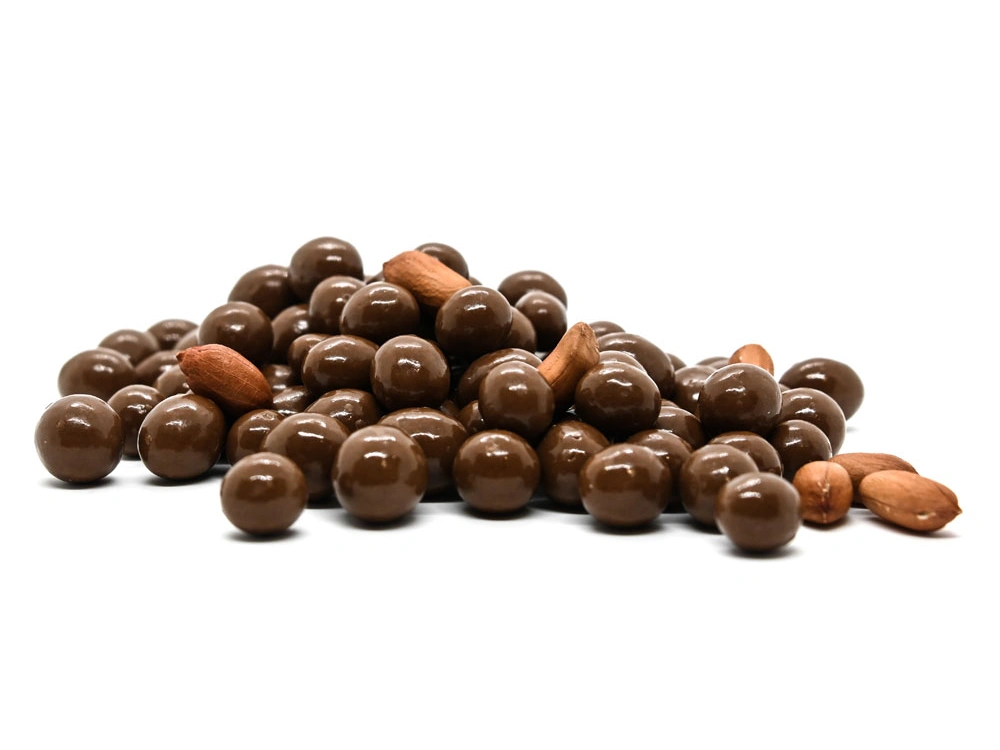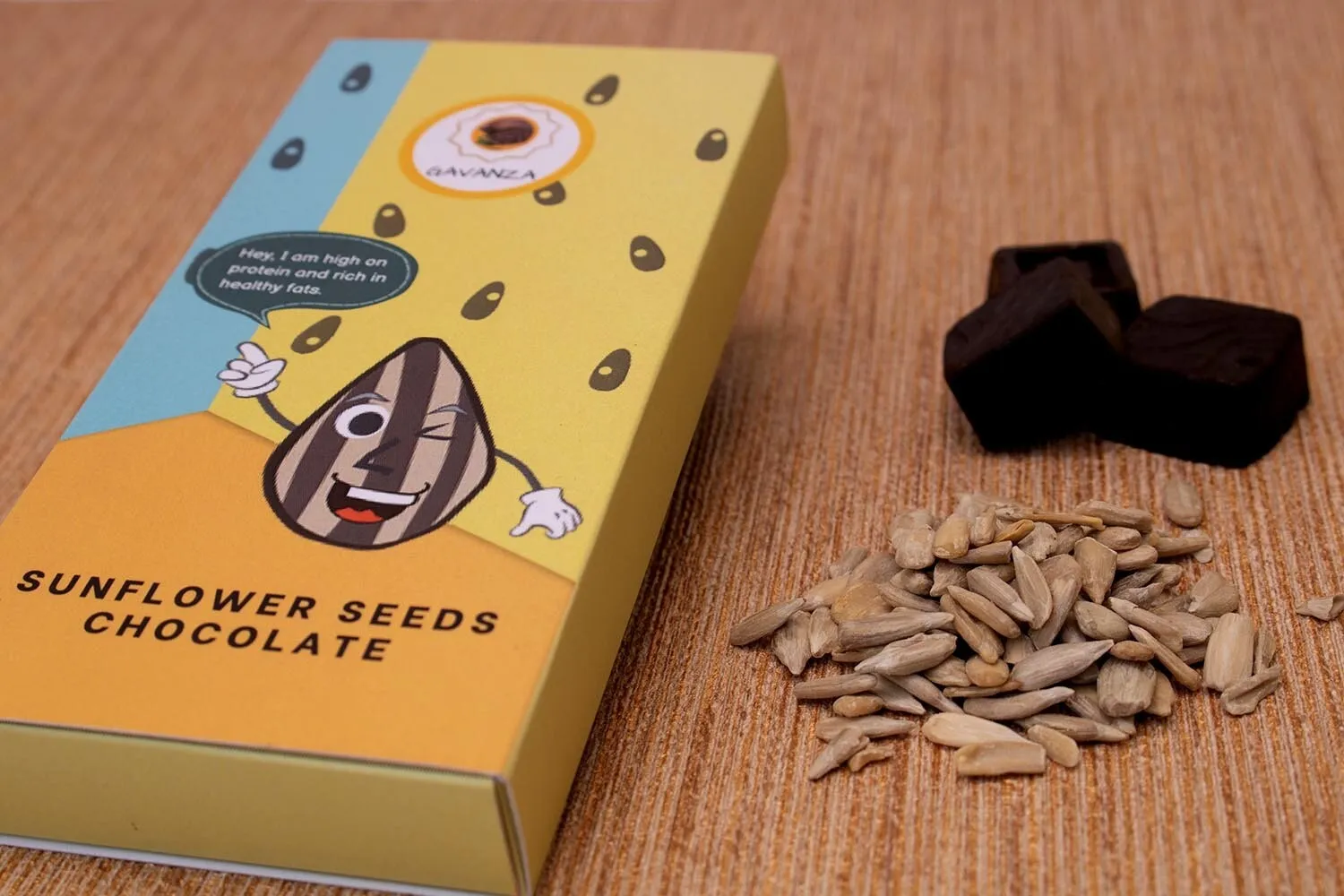Lorsque vous dégustez un délicieux chocolat, vous êtes-vous déjà demandé si vous deviez le donner à votre chat ? L'arôme alléchant et le goût sucré du chocolat incitent souvent les gens à le partager avec leurs animaux de compagnie. Cependant, avant de le lui donner, arrêtez-vous et réfléchissez : le chocolat est-il vraiment sans danger pour les chats ? Les chats peuvent-ils manger du chocolat ?
Cette question ne concerne pas seulement les habitudes alimentaires des animaux de compagnie, mais aussi leur santé et leur vie. Cet article examine en profondeur la question de savoir si les chats peuvent manger du chocolat, en révèle les fondements scientifiques et les risques potentiels, et vous aide à faire un choix judicieux pour que votre chat bien-aimé soit à l'abri du danger.
Composition du chocolat
La composition du chocolat en fait un aliment complexe et variable. Il est essentiel de comprendre la composition du chocolat pour comprendre ses effets sur les chats.
Théobromine et caféine : Les principaux composants du chocolat et leurs effets sur l'homme
L'un des principaux composants du chocolat est la théobromine, un alcaloïde similaire à la caféine. La théobromine et la caféine appartiennent toutes deux à la classe des méthylxanthines, des substances dont la structure chimique et les voies métaboliques dans le corps humain sont très proches. Chez l'homme, ces composants ont les effets suivants :
- Rafraîchissant : la caféine et la théobromine sont toutes deux des stimulants du système nerveux central, qui peuvent améliorer la vigilance et la concentration.
- Améliorer l'humeur : Une consommation modérée de caféine et de théobromine peut stimuler la sécrétion de dopamine dans le cerveau, ce qui provoque une sensation de plaisir.
- Santé cardiovasculaire : De petites quantités de ces substances sont bénéfiques pour le système cardiovasculaire, en augmentant la contractilité du muscle cardiaque et en favorisant la circulation sanguine.
Cependant, si une consommation modérée est bénéfique pour l'homme, une consommation excessive peut provoquer des palpitations, de l'anxiété et des troubles du sommeil.
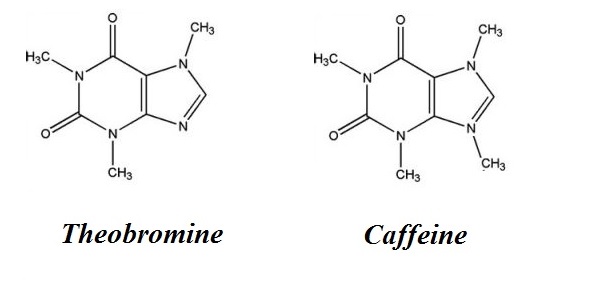
Différents types de chocolat et leur teneur en théobromine
La teneur en théobromine et en caféine varie considérablement d'un type de chocolat à l'autre. Ces différences proviennent principalement de la teneur en matière sèche de cacao.
- Le chocolat noir : Le chocolat noir contient généralement jusqu'à 70-85% de cacao, et c'est donc celui qui contient le plus de théobromine et de caféine. Chaque 100 grammes de chocolat noir contient environ 450-1600 mg de théobromine et 40-80 mg de caféine.
- Le chocolat au lait : Le chocolat au lait a une teneur en matière sèche de cacao plus faible, généralement comprise entre 10 et 50%. Chaque 100 grammes de chocolat au lait contient environ 150-450 mg de théobromine et 15-40 mg de caféine.
- Le chocolat blanc : Le chocolat blanc ne contient pratiquement pas de cacao et ses principaux ingrédients sont le beurre de cacao, le sucre et le lait. Par conséquent, la teneur en théobromine et en caféine du chocolat blanc est extrêmement faible, voire négligeable.
Toxicité du chocolat pour les chats
La théobromine et la caféine contenues dans le chocolat sont toxiques pour les chats. Ces substances affectent négativement les processus métaboliques des chats, entraînant une série de problèmes de santé graves. Les chats peuvent-ils manger du chocolat ? La réponse est un non catégorique.
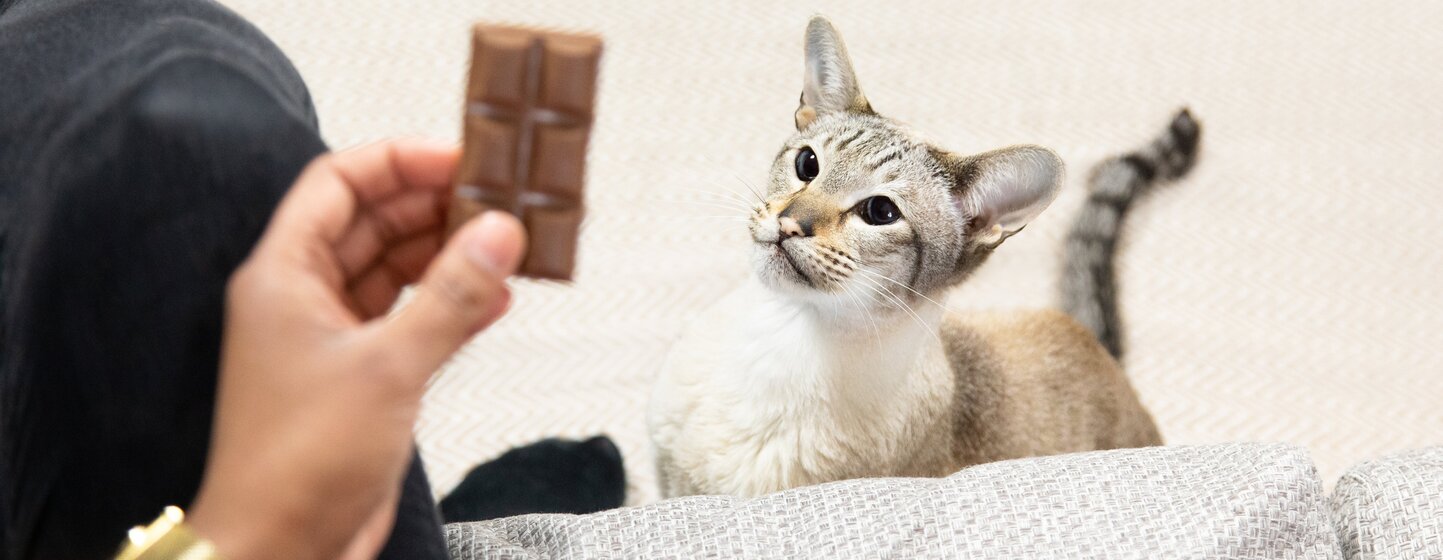
Effets de la théobromine et de la caféine sur les chats
Les chats ont un système métabolique différent de celui des humains et leur tolérance à la théobromine et à la caféine est beaucoup plus faible que celle des humains. Voici les principaux effets de ces substances sur les chats :
- Système nerveux central : La théobromine et la caféine sont toutes deux des stimulants et une consommation excessive peut entraîner une surexcitation du système nerveux central du chat.
- Système cardiovasculaire : Ces substances peuvent accélérer le rythme cardiaque et provoquer des arythmies, voire un arrêt cardiaque.
- Système digestif : La théobromine et la caféine peuvent irriter le tractus gastro-intestinal et provoquer des vomissements et des diarrhées.
Symptômes et réactions si les chats mangent du chocolat
Lorsque les chats mangent du chocolat, ils présentent une série de symptômes toxiques, dont la gravité dépend de la quantité ingérée et du type de chocolat.
- Vomissements et diarrhée : Ce sont les premiers symptômes les plus courants. La théobromine et la caféine peuvent irriter le tractus gastro-intestinal du chat, provoquant des vomissements et des diarrhées qui peuvent entraîner une déshydratation et un déséquilibre électrolytique.
- Arythmie cardiaque : Les effets stimulants de la théobromine et de la caféine sur le système cardiovasculaire peuvent provoquer une arythmie, qui se manifeste par un rythme cardiaque rapide ou irrégulier. Cet état peut évoluer vers un arrêt cardiaque, qui met la vie en danger.
- Surexcitation ou dépression : Après la stimulation du système nerveux central, les chats peuvent présenter des comportements anormaux tels que la surexcitation, l'anxiété, des tremblements, voire des crises d'épilepsie. Inversement, certains chats peuvent faire preuve de dépression, de léthargie et de faiblesse.
- Epilepsie : Des doses élevées de théobromine et de caféine peuvent provoquer des crises d'épilepsie chez les chats. Cette affection nécessite une intervention médicale immédiate, faute de quoi elle peut avoir des conséquences graves.
- Conséquences potentiellement fatales : Si elle n'est pas traitée, l'intoxication au chocolat peut provoquer de graves lésions organiques et mettre en danger la vie du chat. Des doses élevées de théobromine et de caféine peuvent provoquer une insuffisance cardiaque, une insuffisance respiratoire, voire la mort.
Le chocolat noir et le chocolat à cuire sont plus toxiques que le chocolat au lait et le chocolat blanc. Si votre animal a ingéré du chocolat, nous vous recommandons de contacter immédiatement votre vétérinaire et de lui indiquer le poids de votre animal, le type et la quantité de chocolat ingéré afin que des mesures appropriées puissent être prises le plus rapidement possible.
Traitement d'urgence
Lorsque l'on découvre qu'un chat a ingéré du chocolat, les mesures suivantes doivent être prises immédiatement pour minimiser le risque d'empoisonnement et protéger la santé du chat.
Que faire si un chat mange du chocolat ?
- Contactez un vétérinaire : Contactez un vétérinaire dès que possible pour obtenir des conseils et une aide professionnels. Même si la quantité de chocolat ingérée ne semble pas importante, elle doit être traitée avec prudence.
- Fournir des informations sur l'animal : Fournissez au vétérinaire des informations détaillées sur l'animal, notamment son poids, le type et la quantité de chocolat ingéré. Ces informations sont essentielles pour évaluer la gravité de l'empoisonnement et élaborer un plan de traitement.
Méthodes de traitement vétérinaire courantes
Le vétérinaire prendra les mesures thérapeutiques appropriées en fonction de la situation spécifique du chat. Les méthodes de traitement les plus courantes sont les suivantes
- Faire vomir : Si le chat vient d'ingérer du chocolat, le vétérinaire peut le faire vomir pour réduire l'absorption de la théobromine et de la caféine dans l'organisme. Il est généralement préférable de le faire dans les 1 à 2 heures suivant l'ingestion.
- Charbon actif : Le vétérinaire peut administrer au chat du charbon actif pour absorber la théobromine et la caféine dans le tractus gastro-intestinal afin d'empêcher toute nouvelle absorption. Le charbon actif doit être utilisé immédiatement après le vomissement.
- Médicaments et surveillance : En fonction de la gravité de l'empoisonnement, votre vétérinaire peut utiliser divers médicaments, tels que des médicaments contre les crises d'épilepsie, des médicaments pour le rythme cardiaque et des fluides intraveineux. En outre, votre vétérinaire surveillera étroitement votre chat pour observer les changements dans son rythme cardiaque, sa respiration et son système nerveux, afin de s'assurer que le traitement est adapté en temps voulu.
Le temps est un facteur essentiel en cas d'empoisonnement au chocolat. Une action rapide et un traitement professionnel peuvent augmenter de manière significative le taux de survie d'un chat et réduire les dommages à long terme sur sa santé. Les propriétaires d'animaux de compagnie doivent rester vigilants et veiller à ce que leurs chats ne soient pas exposés au chocolat et, en cas d'urgence, consulter rapidement un vétérinaire.
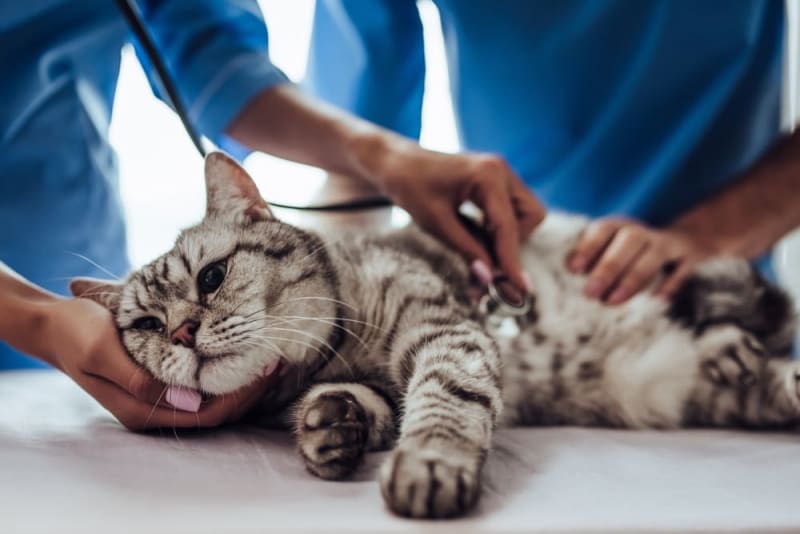
Mesures préventives
La prévention est le meilleur moyen de protéger votre chat contre l'empoisonnement au chocolat. Voici quelques mesures préventives pratiques pour assurer la sécurité de votre chat.
Comment conserver le chocolat pour éviter que les chats ne l'ingèrent accidentellement ?
- Conservez le chocolat en hauteur : Conservez le chocolat dans un endroit élevé où les chats ne peuvent pas l'atteindre, par exemple sur le dessus d'une armoire ou dans un meuble de rangement fermé.
- Utilisez des récipients hermétiques : Conserver le chocolat dans une boîte hermétique permet non seulement d'en préserver la fraîcheur, mais aussi d'empêcher les chats de renifler et d'essayer d'ouvrir l'emballage.
- Nettoyez les résidus à temps : Veillez à ce qu'il n'y ait pas de résidus de chocolat sur les tables, les comptoirs et autres surfaces afin d'éviter que les chats n'ingèrent accidentellement les miettes tombées.
Connaître les autres aliments toxiques présents dans la maison pour garantir un environnement sûr
- Dressez une liste des aliments toxiques : Connaître et dresser une liste des aliments courants dans la maison qui sont toxiques pour les chats, tels que les oignons, l'ail, le raisin, les raisins secs, l'alcool, la caféine, etc.
- Gardez ces aliments hors de portée des chats : Veillez à ce que ces aliments soient également stockés dans des endroits inaccessibles aux chats afin d'éviter toute ingestion accidentelle.
- Utilisez des dispositifs de protection pour les chats : Installez des dispositifs de protection des chats, tels que des serrures ou des portes pour chats dans la cuisine et les zones de stockage, afin de limiter le champ d'action des chats.
Sensibiliser les membres de la famille et les visiteurs aux dangers du chocolat pour les chats
- Communiquer au sein de la famille : informer les membres de la famille, en particulier les enfants, des dangers du chocolat pour les chats et insister sur le fait qu'il ne faut pas donner de chocolat aux chats.
- Rappel concernant les visiteurs : Lorsque vous recevez des visiteurs, rappelez-leur de ne pas laisser de chocolat ou d'autres aliments toxiques à la portée des chats.
- Affichage d'informations : Placez des panneaux d'avertissement dans des endroits bien visibles, comme la cuisine ou le salon, pour rappeler à tout le monde de faire attention à la sécurité alimentaire des animaux de compagnie.
Conclusion
Le chocolat est gravement toxique pour les chats et ses effets néfastes potentiels ne doivent pas être ignorés. En comprenant la composition du chocolat et ses effets sur les chats, les propriétaires d'animaux peuvent prendre les précautions nécessaires pour assurer la sécurité et la santé de leurs chats.
Le fruit de la chance s'engage à prendre soin de votre santé et de celle de votre chat. Nous avons spécialement conçu une série de snacks au chocolat, chacun étant emballé individuellement, ce qui est non seulement pratique à transporter et à stocker, mais empêche également les chats de les manger accidentellement. Nous vendons en gros des snacks au chocolat, y compris des graines de tournesol enrobées de chocolat en vrac, des cacahuètes enrobées de chocolat en vrac, des bonbons gélifiés au chocolat, des bonbons à éclater au chocolat et des boules croustillantes au chocolat en vrac dans différents emballages.
Nous espérons que les propriétaires d'animaux de compagnie pourront profiter d'une nourriture délicieuse tout en garantissant la sécurité de leurs animaux. Choisissez Lucky Le fruit de la chanceun fabricant de snacks au chocolat socialement responsable, comme votre premier choix pour les achats en vrac de snacks au chocolat. Cliquez ici pour découvrir nos snacks chocolatés en gros.

